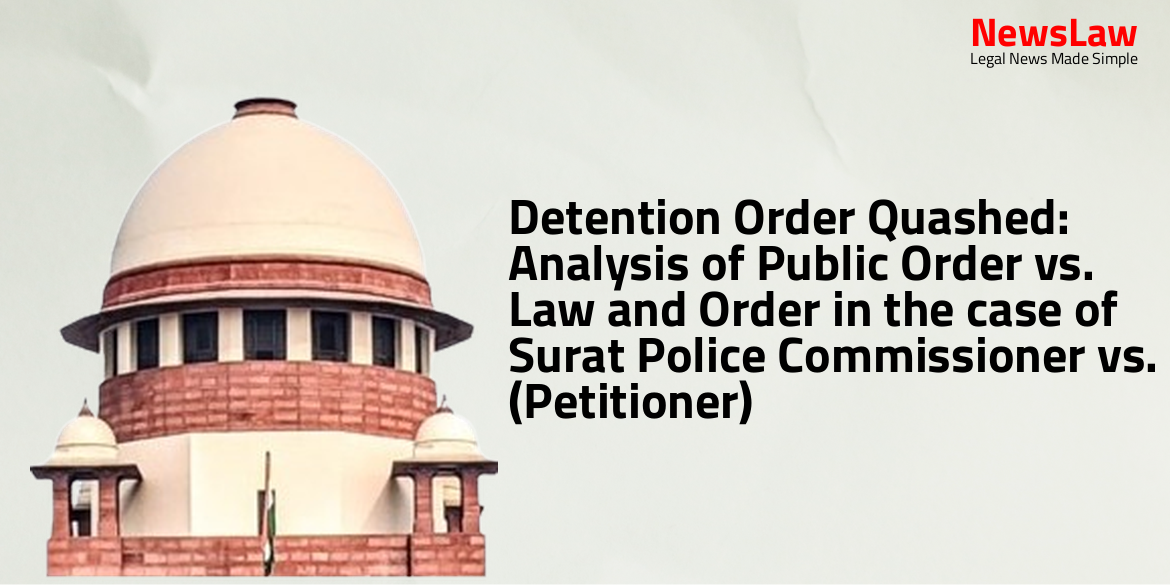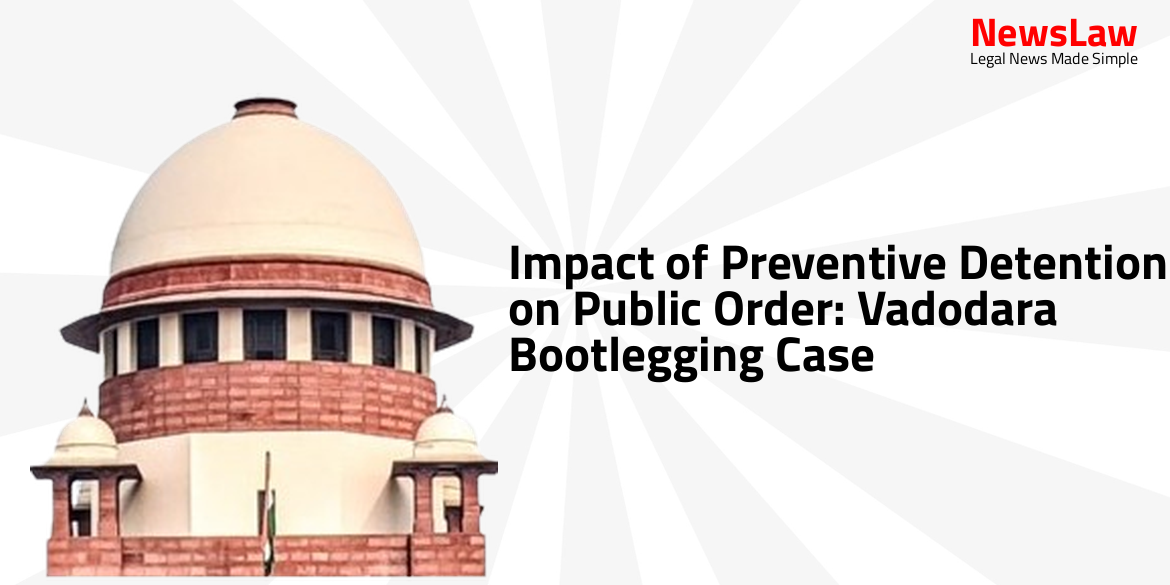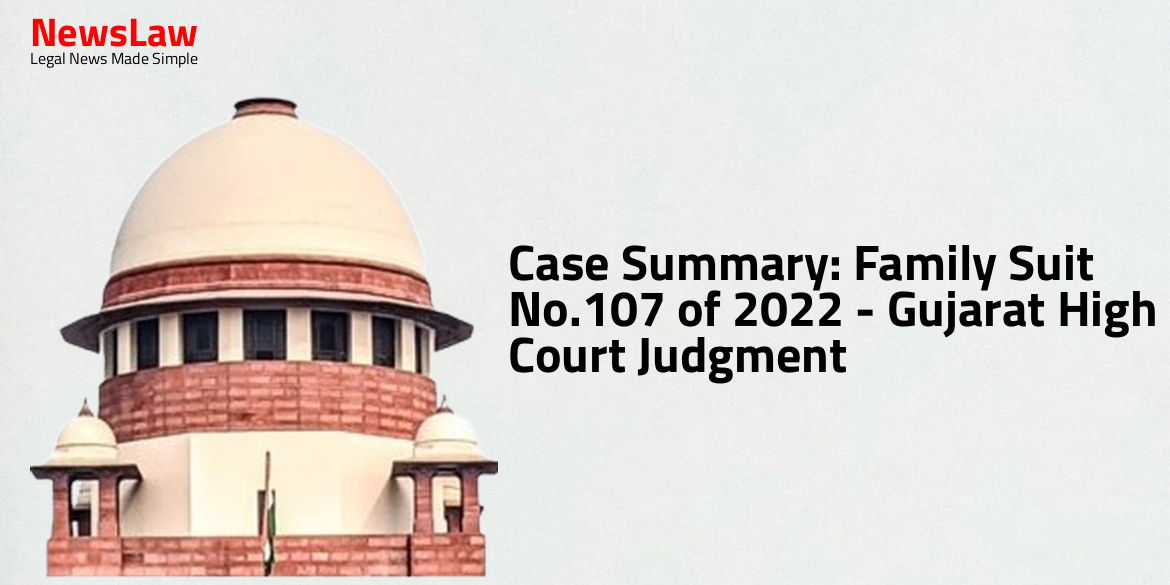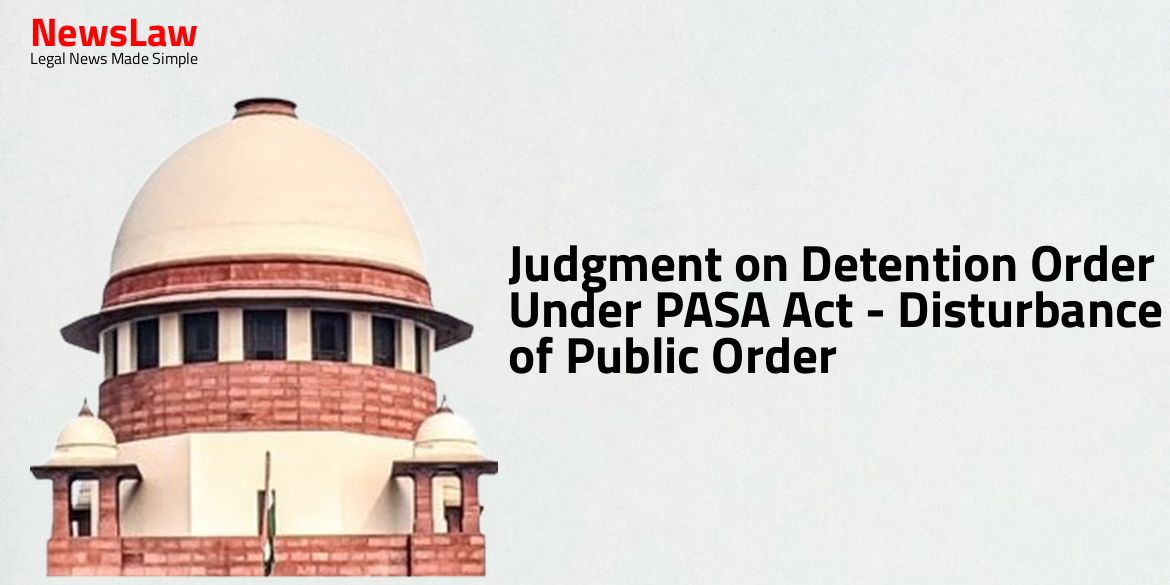In a significant ruling by the Gujarat High Court, the detention order passed by the Surat Police Commissioner has been quashed in the case of Surat Police Commissioner vs. (Petitioner). The judgement delves into the critical differentiation between public order and law and order, emphasizing the necessity for preventive detention to be based on factors impacting public order. Stay tuned for a detailed analysis of the court’s decision and its implications on legal proceedings.
Facts
- The petitioner was preventively detained as a “dangerous person” under the Gujarat Prevention of Anti-social Activities Act, 1985.
- The petitioner has challenged the legality and validity of the detention order dated 16.01.2024 passed by the Police Commissioner, Surat.
- The order impugned was executed upon the applicant.
- The petitioner is seeking relief from the court regarding the detention order.
Issue
- The issue at hand is whether the order of detention passed by the Detaining Authority under the Act of 1985 is lawful.
- The Detaining Authority based the order on the detenue’s antecedents and past activities.
- The purpose of the order is to prevent the detenue from acting in a manner prejudicial to public order in Surat.
- The Court has considered all facts and submissions from both parties in determining the sustainability of the detention order.
Arguments
- The advocate for the detenue argues that the grounds of detention are related to law and order, not public order
- The registration of the offence is not affecting or likely to affect public order
- The alleged offences do not impact the maintenance of public order but are only related to law and order
- The advocate claims that the detenue’s activities are only prejudicial to law and order, not public order
Analysis
- Based on analysis of three criminal cases, the authority wrongly concluded that the detenue’s actions were prejudicial to public order.
- Detention under ordinary criminal law is applicable for such cases, not preventive detention for disturbing public order.
- Although incidents of beating by the detenue occurred as alleged, they do not necessarily impact public order.
- The detenue was granted bail in all mentioned offenses, indicating the nature of the crimes.
- Merely being a bootlegger does not warrant preventive detention unless activities adversely affect public order.
- Drawing a line between serious disorder affecting the community and minor breaches primarily harming individuals is essential in preventive detention cases.
- A disturbance must go beyond a mere breach of law and order to warrant action under the Preventive Detention Act.
- The detaining authority failed to prove that the detenue’s antisocial activities affect public order adversely.
- The alleged offenses committed by the detenue do not disrupt the even tempo of community life or impact public order significantly.
- The offenses do not bear relevance to the maintenance of public order.
- Distinction between ‘law and order’ and ‘public order’ clarified in Pushkar Mukherjee v. State of West Bengal.
- Assault or injury to specific persons does not necessarily lead to public disorder.
- Consequences of contravention of law must affect the community or public at large for it to be public disorder.
- Detention order in Piyush Kantilal Mehta Vs. Commissioner of Police, Ahmedabad based on registration of two prohibition offences.
- Reference to Pushkar Mukherjee Vs. State of Bengal, 1969 (1) SCC 10 for clarification on law and order disturbance leading to detention order.
- The court carefully considered the offences alleged against the petitioner in the order of detention.
- The allegations made by the witnesses were also taken into account.
- The court concluded that the offences or allegations did not create a sense of insecurity, panic, or terror among the public.
- The activities of the detenue were not found to adversely affect or likely to affect the maintenance of public order in the area.
- The subjective satisfaction of the detaining authority was deemed to be not legal, valid, and in accordance with law.
- Therefore, the order of detention was not upheld as it was not considered to be in line with maintaining public order.
Decision
- Direct service permitted.
- Rule is made absolute accordingly.
- Detenue to be set at liberty forthwith if not required in any other case.
- Petition allowed.
- Order dated 16.01.2024 passed by the respondent authority quashed.
Case Title: HIMANSHU @ GOLIYA S/O PREMNATH KARANKALE Vs. STATE OF GUJARAT
Case Number: R/SCA/4808/2024



